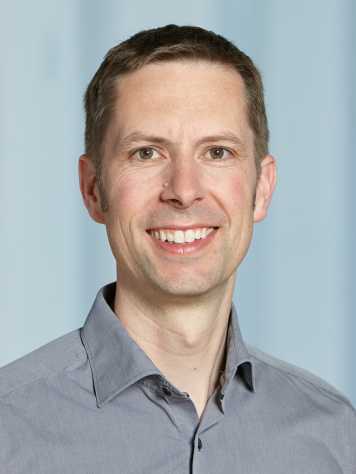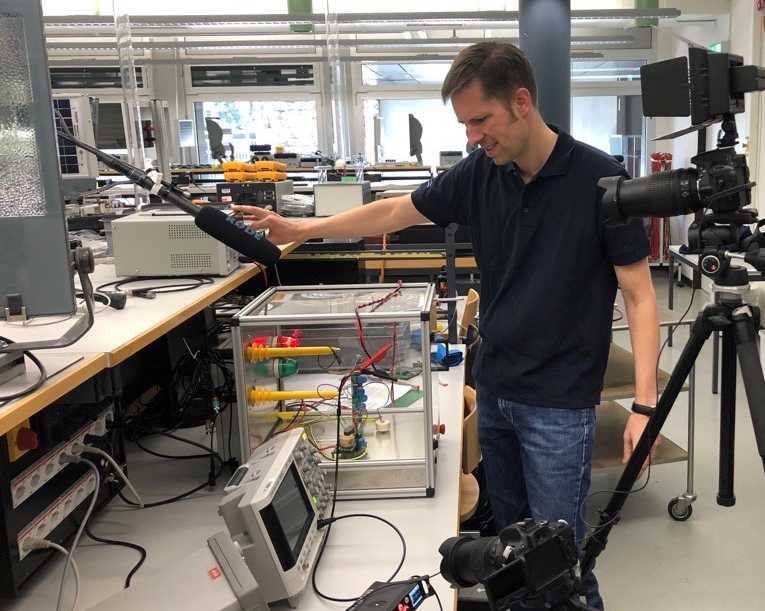"Electrical energy plays a key role in the sustainable energy supply"
In the interview, Prof. Christian Franck talks about the major societal tasks he would like to help solving with his work, and his experiences with online courses in the Corona crisis.
Prof. Franck, congratulations on the full professorship! Could you briefly describe your activities at D-ITET in more detail?

Thank you! This is a great recognition for me and my team and our work and commitment of the past years.
In research, we deal on the one hand with classical high-voltage technology, which means the control of high electric field strengths, and on the other hand with new technologies for the electric energy system of tomorrow. The second area goes beyond pure high-voltage engineering and also includes interfaces to other disciplines of engineering sciences, but also to materials science, mechanical engineering, process engineering or basic questions of physics.
We try to produce and operate the hardware of the energy system with modern and environmentally friendly materials. For example, we are developing ways of replacing the much-used SF6 gas with its problematically high greenhouse potential – one kilogram of the gas has the same effect in the atmosphere as 23.5 t CO2. We are also researching into new insulation materials for power electronics applications, as their stress has increased sharply in the recent years. In general, there are new possibilities and demands in all areas today. These result in a multitude of research areas for us. Again and again we have also cooperations and projects where our know-how in the field of controlling and using high electrical field strengths is in demand. We have had smaller cooperations with groups from the field of food processing and knee orthoses – or projects in which we try to use technologies from other disciplines for our applications, for example for the measurement of electric field strengths with purely optical methods.
Regarding teaching, we offer various introductory and special lectures for students of the specialization "Energy and Power Electronics" and the Master’s in "Energy Science and Technology". In the Bachelor's programme, I have the pleasure and the honor to get to know the freshmen in the lecture "Networks and Circuits I" and to support them at the beginning of their programme. In the third year, we have newly created the course "Experimental and Measurement Techniques" for all students who later want to work experimentally. Here, students learn the important basics of experimenting, measuring, critical evaluation and calculating the measurement uncertainty in theory and practice.
“«Our mission is to research and to develop new technologies for electric power transmission and distribution that are also socially accepted.»”Prof. Christian Franck
What brought you to this area? What fascinates you about it?
I came to high voltage engineering after taking a series of detours. Very early on I knew that I wanted to do something technical and scientific and thus decided to study physics. A key experience for me was a lecture on the "energy question" by Klaus Heinloth, which I attended as an undergraduate student in Bonn in 1995. This fascinated me so much that from then on, I was convinced that I wanted to work in the field of renewable energies.
What I find particularly exciting about this field are the diverse, interdisciplinary areas we encounter in our research, from classical electrical engineering and electronics to materials science and quantum chemistry. My team includes researchers from the fields of electrical engineering, physics, mechanical engineering and process engineering. It fascinates me how important this field is for the development of our society in the long term and how challenging and relevant the research questions are, without making a big hype about it. Of course, this is also very important for the graduates of our field of specialization, who after their studies or doctorate are in great demand as experts in both small and large companies.
What impact does your research have on society? What are currently the greatest challenges in your research area?
Even though we have been talking about the "energy turnaround" for about a decade, we are still at the beginning of a fundamental and comprehensive change in the entire energy system. Electrical energy plays a key role in this process. Worldwide, we still use only a low double-digit percentage of renewable energy. Only recently, the Federal Council increased the targets for domestic renewable energy production by 50% until 2050. This is an enormous social challenge. This is not only about the electrical energy system, but also about decarbonisation in transport, buildings and industry. The key is always the connection between consumers and sources. Our task is to research and to help develop new technologies for transmission and distribution that are also socially accepted. For example, a conversion of existing infrastructure is generally better accepted than its new construction. In addition, technologies with low environmental impact are preferred. The technologies that are developed must be robust and reliable, as investments in this area are always long-term. Even in difficult times we have many cooperations with a wide range of industrial partners. This also shows that basic research can be done at universities, which is not possible in the companies themselves.

In view of the rapidly changing developments around COVID-19, you certainly have to face other major challenges. Could you describe them to us?
That's right. As a predominantly experimental research group, we are directly affected and most of our work cannot be carried out as usual. Nevertheless, a great deal of work is done on and with the computer, so we are prioritizing these tasks now in our home office. We still hold our team meetings on a regular basis, but we miss the direct interaction. It is only now that one realizes how closely the teams normally work together and exchange information. It's all a bit more complicated now.
What are your first experiences with the new online lectures and exercises? How do the students react to the new situation?
Most students are very structured and react well, even if the new situation is a big challenge. Everything came so suddenly and without much time for preparation, so all lecturers organized themselves differently. We are lucky that we have been using "Moodle" for a long time, so now we can simply continue to use it. Lectures via Zoom or as video recordings are good, but not a complete substitute for direct exchange. The interaction in the lectures suffers a lot, but maybe I have not found the right ways yet. The biggest challenge was our lecture on "Experimental and Measurement Techniques". Here, the students should have implemented and applied what they had learned theoretically in several large practical courses in experiments. Instead, we lecturers have now filmed ourselves conducting the experiments. The students then analyse this and evaluate the measurement data. About two thirds of the students continue the lecture under the new circumstances and the feedback is very positive.
My personal highlight is the #StayAtHome experiment, which we introduced at short notice. Here the students are asked to plan and carry out an experiment on their own with quantitative measuring equipment available at home. I am enthusiastic how creative the groups were. The experiments range from determining the conductivity of liquids and graphite powder with magnetic field sensors in smartphones to defining the gravitational constant and repeating Eratosthenes' experiment to measure the Earth's radius. In this group, some of the students have returned to their families abroad and now use the physical distance as an advantage.
Will the Corona crisis have a lasting effect on teaching? Do you think that you will increasingly use digital learning environments and forms in your lectures in the future?
The trend towards digitization in teaching existed before, it is accelerated by the crisis and it is now becoming clear what works and what does not. The situation also underlines the special value of direct interpersonal communication. We have been using many online tools for quite some time now, but I still don't think that complete digitization without physical presence makes much sense. However, we will certainly make more use of an online task portfolio, especially for supporting students individually. I think that the openness towards new forms of teaching will generally be greater after the crisis. I am sure that a healthy mixture between digital forms of learning and direct exchange will be established and consolidated.
